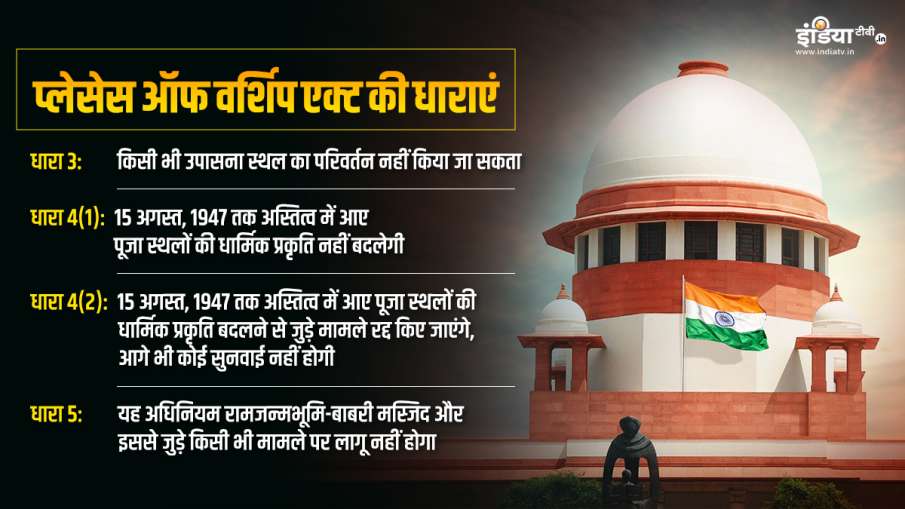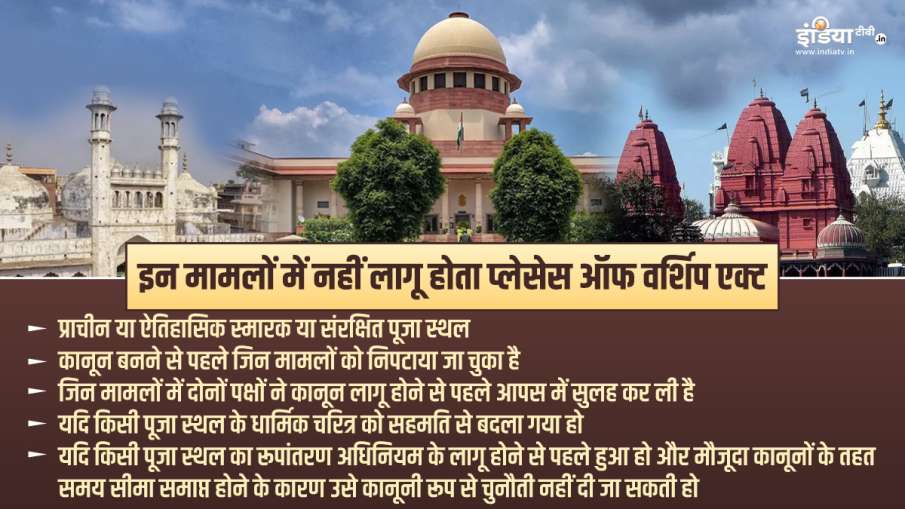Don't Miss Our Holiday offers - up to 50% OFF! & More..


What is the Places of Worship Act, why is it demanded to be cancelled, why was it not implemented in the dispute between Ram Mandir and Babri Masjid? – eSHOP24X7

Law on places of worship
An application has been made to the Supreme Court to repeal the Places of Worship Act. Separate petitions said the Act removes the right of any individual or religious group to seek judicial redress to claim a place of worship. For this reason this Law should be repealed. At the same time, some petitions have said that this law protects religious places and prevents disputes related to places of worship. In such a situation, all petitions filed to repeal this Act must be cancelled.
The Places of Worship Law was enacted in 1991. Its objective was to prevent disputes related to places of worship in the country. However, now this act itself has come into controversy. Let us know what the Places of Worship Law is. Why is there a demand to cancel it and if this Act did not become an obstacle in the hearing of the dispute between Ram Mandir and Babri Masjid, then why is this Act being applied in other disputes between temples and mosques?
What is the Places of Worship Law?
The Places of Worship Act, 1991 was enacted in the year 1991 during the Congress government. At that time, PV Narasimha Rao was the Prime Minister and the issue of Ram Mandir Babri Masjid was very hot. After the dispute between Ram Mandir and Babri Masjid gained momentum, disputes between temples and mosques started appearing in other parts of the country as well. This had created a tense atmosphere in the country. This law was made to address this. In this law it is clearly written that the structure of religious places in the country, as it was at the time of 1947, will remain the same. The basic structure of the religious place will not be altered. Any petition reclaiming that religious site or demanding the removal of the religious site will be rejected. If a person violates this rule, they will have to pay a fine and may also face a prison sentence of up to three years.


Law on places of worship
Why is it necessary to repeal the Places of Worship Law?
The Places of Worship Law says that any religious place that existed in the country at the time of 1947 will remain as it is. No petition against this will be heard. The temple-mosque dispute continues at Gyanvapi Masjid, Sambhal Masjid and many other places. The Hindu side claims that the temple was demolished and a mosque was built on that site. Hindus should have the right to worship there. Like Babri Masjid, other disputed mosques should also be investigated and if confirmed to be temples, temples should be built there. However, according to the Places of Worship Act, the original structure of any religious place cannot be altered. Because of this, the current dispute is not heard in many places. For this reason, it is required to repeal this Law. So that this petition can be presented on other disputes related to the temple-mosque.
Why was it not applied in the dispute between Ram Mandir and Babri Masjid?
When this law was enacted, the dispute between Ram Mandir and Babri Masjid was at its peak. In such a situation, Parliament had decided that this law will not be applicable in the case of the dispute between Ram Temple and Babri Masjid in Ayodhya. For this reason, the hearing on this dispute continued for a long time. After this, the decision was for the benefit of the temple and now the Ram temple is ready. However, now, if there is any change in the original form of any religious place, then this law will be applicable and will protect that religious place. For this reason it is demanded that the law be repealed, so that all parties can claim those places to which their religious feelings are linked, but that the religious places there belong to people of some other community.


Law on places of worship
What are the arguments of both sides?
Ashwini Upadhyay has filed a petition to repeal this law. Upadhyay has sought to repeal sections two, three and four of the Places of Worship (Special Provisions) Act, 1991. One of the arguments put forward in the petition is that these provisions remove the right of an individual or religious group to seek judicial redress to claim a place of worship. Upadhyay asserted that the entire law is unconstitutional and there is no question of reinterpreting it. Marxist Communist Party and Maharashtra MLA Jitendra Satish Awhad have also filed petitions against several pending petitions questioning the constitutional validity of the Places of Worship (Special Provisions) Act, 1991, saying the law is a threat to public order, the fraternity, unity and protects secularism. . In most cases, the Muslim side has cited the 1991 law and argued that such cases are not acceptable. Six petitions, including one filed by former Rajya Sabha member Subramanian Swamy, have been filed against the provisions of this law.







